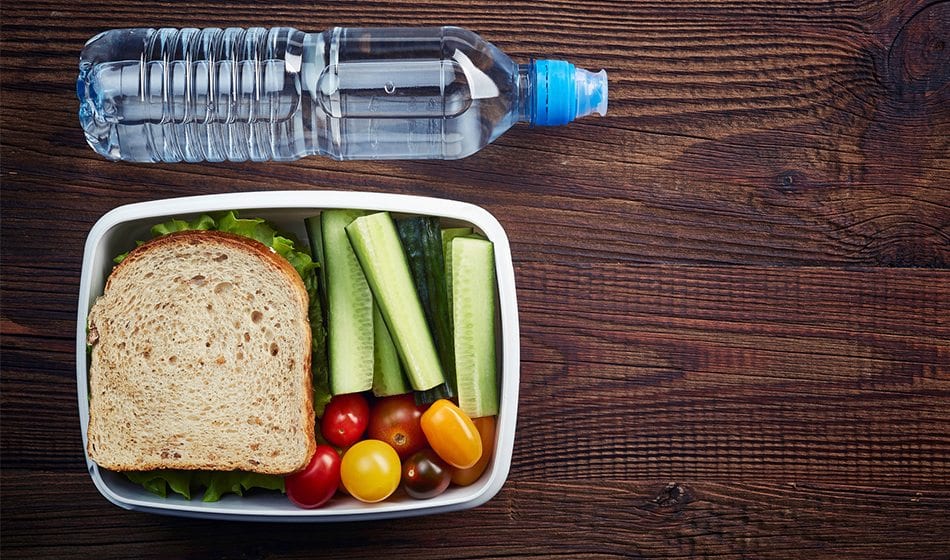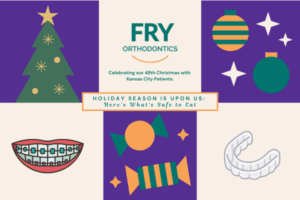
Help us celebrate national nutrition month at Fry Orthodontics by learning healthy, nutritious ways to care for your body AND your braces!
Healthy Eating Habits and Braces
We all know that developing healthy eating habits and sticking to them can be a challenge. If you are wearing braces, maintaining a high level of oral health through a healthy diet is more important than ever, as healthy teeth respond better to orthodontic treatment. A healthy diet can be particularly challenging for the orthodontic patient due to the food restrictions they have. It’s not uncommon for people wearing braces to turn to foods of convenience which can tend to be high in sugars and fats. When foods high in sugar get stuck in braces and are not properly cleaned, it increases oral acidity which leaves the teeth more prone to cavities and other oral health problems that could possibly prolong treatment.
Making healthy lifestyle changes doesn’t have to be dramatic though! There are many things you can do differently to improve your overall health this month, and hopefully it will lead to habits that last a lifetime. Not only will your body love you, but your TEETH will appreciate your nutrition as well.
Simple Changes You Can Make to Celebrate National Nutrition Month
1) Be Active
We all know exercise has many health benefits, but you don’t necessarily have to hit the gym to see those benefits. Try just taking a walk or getting out in the yard with your kids for a game of catch or basketball. Aim for at least 60 minutes of activity a day.
2) Drink More Water Throughout the Day
Stay hydrated by drinking plenty of water instead of sugary drinks, especially if you are active or live or work in warmer conditions. Soda and other sugar-filled beverages are also poor choices for people who wear braces. Sugars tend to hide behind brackets and wires making keeping your teeth clean very difficult.
3) Portion Control
Use your measuring cups or kitchen scale to make sure your portions are not out of proportion. Try to use half of your plate for fruits and vegetables and the other half for grains and lean protein foods.
4) Know your Food Labels
Educate yourself by reading the nutrition facts on your food to help you drink and eat smarter.
5) Prepare Healthy Snacks
Pack healthy snacks to munch on throughout the day that will help sustain your energy levels between meals! Here are some healthy snack options:
- Apple or celery with peanut butter
- Low-fat cottage cheese (Great braces option!)
- Raw vegetables
- Yogurt (Great braces option!)
- Smoothies (Great braces option!)
- Hard boiled eggs (Great braces option!)
- Mixed nuts
6) Slow Down at Mealtime
Try not to mindlessly eat on the run. Sit down and focus on your food! Eating slower increases the level of hormones that tell your brain you are full which may help you to reduce your calorie intake.
7) Be Smart when Dining Out
If you’re going somewhere you’ve never been before, check out the menu online before you actually go. This will allow you to compare nutrition information and make more informed decisions to better stick to your goals. Look for items that are labeled: grilled, baked, broiled, or steamed.
8) Cook at Home
Preparing your own meals is not only healthier than eating out, but it is more cost effective too. Cooking at home also allows you to meal prep for lunches during the week. This helps you avoid the temptations of going through a drive-through.
9) Cut Down on Added Sugars
Food and drinks with extra sugars are empty calories with little to no nutritional value. This is not on only bad for your body, but for your dental health as well. These added sugars can make your teeth more susceptible to decay, especially if you are wearing braces.
10) Add Seafood into Your Diet
Eating seafood a couple times a week introduces healthy omega 3 fats into your diet! Examples include: trout, oysters, salmon, and sardines
11) Explore New Foods While Shopping
Look for fruits, vegetables and whole grains you’ve never tried before – you might find something you really like!
12) Consult an RDN
A Registered Dietitian Nutritionist (RDN) can help give you personalized, easy to follow nutrition advice. This is also a great step to take if you are someone who needs help losing weight or need to control a chronic disease through diet.
13) Make Half your Plate Fruits & Vegetables
Try out different types of fruits and vegetables so you don’t get bored with constantly eating the same thing. There are endless options when it comes to fruits and veggies, and they can be bought fresh, frozen, or even canned!
14) Experiment with Plant-Based Meals
Try eating one meatless meal a week. Many recipes that call for meat, can easily be made without it. Try substituting with vegetables, lentils or beans.
15) BALANCE!
Remember not to be too hard on yourself! Life is all about balance, and it’s the best way to maintain a long, healthy lifestyle.





